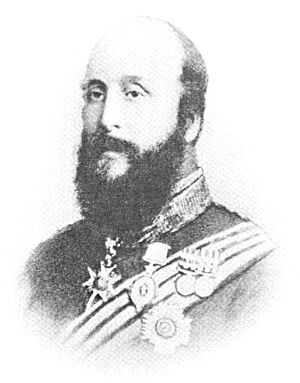Alfred Thomas Wilde facts for kids
Sir Alfred Thomas Wilde (born November 1, 1819 – died February 7, 1878) was an important British military officer who served in India. He rose to the rank of Lieutenant-General.
Wilde came from a well-known family. His brother was Lord Penzance, and his uncle was Lord Chancellor Truro, who was a very high-ranking judge. Alfred Wilde went to Winchester College, a famous school, from 1834 to 1837. After school, he joined the East India Company's army as an ensign (a junior officer) on December 12, 1838. He began his service with the 15th Madras Native Infantry in April 1839. He later moved to the 19th Madras Native Infantry.
Contents
Early Military Career in India
Alfred Wilde quickly learned local languages. He became an interpreter in Hindustani in 1843. He served with his regiment during some local unrest on the Malabar coast that same year.
In January 1847, Wilde was made adjutant, which is an officer who helps with administrative tasks. He also became quartermaster and interpreter for his regiment. In 1850, he moved to the 3rd Punjab Infantry and learned Telugu, another Indian language.
Leading Troops in Punjab
In April 1851, Wilde became second-in-command of the 4th Punjab Infantry. He took charge of his regiment and other troops in November when they occupied the Bahadur Khel valley. He was praised by the government for successfully defending the fort of Bahadur Khel from a night attack by Waziri tribesmen. He became the full commander of the regiment in February 1853.
Wilde was promoted to captain in November 1856. The government of India thanked him for his help during a big flood of the Indus River that year.
Service During the Indian Rebellion
In March 1857, Wilde led the 4th Punjab Infantry in an expedition against the Bozdar Baluchis, who were defeated. He also played a key role throughout the Indian Mutiny.
The Siege of Delhi
Wilde and his regiment were part of the important siege of Delhi. He was in the groups that stormed and captured the Delhi magazine and palace in September 1857. During these battles, he was wounded. He also fought in several other actions in December 1857 and January 1858. For his bravery at Delhi, he was promoted to major in January 1858 and received thanks from the government.
The Capture of Lucknow
Wilde continued to lead his regiment during the siege of Lucknow in March 1858. He led a storming party that captured the Begum's palace. He was severely wounded on March 21 during an attack on Goal Masjid, right in the heart of the city. This attack helped secure the capture of Lucknow. After this, he went to England to recover from his injuries.
For his actions, he was mentioned in official reports and promoted to lieutenant-colonel. He was also made a Companion of the Order of the Bath, which is a special award for military service. He received a medal with two clasps, showing he had fought in two major campaigns.
Later Commands and Achievements
Wilde returned to India in 1859. In March 1860, he commanded his regiment in another expedition against the Mahsud Waziris and was again thanked for his service. He was promoted to regimental major in 1861.
In March 1862, he was given command of the Corps of Guides, a famous and important military unit. He led them in an expedition against the Sitana and Mandi fanatics in 1863. He was promoted to colonel and became an aide-de-camp (a personal assistant) to the Queen. He also commanded a brigade that destroyed the villages of Sitana and Mandi.
In 1865, he became the commander of the Punjab irregular force, with the rank of brigadier-general.
Awards and Final Years
In June 1866, Wilde was made a Companion of the Order of the Star of India, another important honor. In 1868, he commanded the field force in the Hazara Black Mountain expedition. He received thanks from the government and another medal for his service.
He was promoted to Knight Commander of the Order of the Bath in June 1869, which meant he could use "Sir" before his name. In July, he became a major-general. When he finally returned from India in 1871, he received a special pension for his good service. In 1877, he was appointed a member of the Council of India, a group that advised the British government on Indian affairs. He was promoted to lieutenant-general in October 1877.
Sir Alfred Thomas Wilde passed away on February 7, 1878. He married Ellen Margaret Greene in 1866.
 | James Van Der Zee |
 | Alma Thomas |
 | Ellis Wilson |
 | Margaret Taylor-Burroughs |


